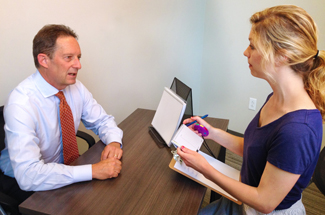Diagnostic Assessment
Drexel Psychological Services Center
What is a diagnostic assessment?

Various assessment tools (e.g., pen and paper tests, computer tasks) are used to measure a client’s behavior, experiences, and/or thoughts and feelings in order to arrive at a diagnosis and guide treatment. The assessments can also help clinicians arrive at hypotheses about the person’s behavior, capabilities, and personality. The assessments utilized are empirically tested to be sound measures that allow us to compare results to normative and/or clinical populations.
How can a diagnostic assessment help?
These assessments can help diagnosis of various cognitive and neurological conditions. They can assist in identifying cognitive strengths and weaknesses for disorders like ADHD and learning disorders. Results can aid in educational planning or rehabilitation services. Assessments can also be performed to understand function in the broader context of personality and mental health. The diagnostic workups can assist mental health providers by differentiating between different possible disorders a client may be suffering from and guiding providers toward validated treatment approaches for specific problems.
What does Drexel’s Diagnostic Assessment Services offer?
The Diagnostic Assessment Service at Drexel’s PSC offers specialized assessments for children and adults with a variety of concerns including:
- assessment of various psychological conditions
- concentration
- executive control
- learning and memory
- ongoing or new problems with attention
- personality assessment
What can I expect when I schedule a diagnostic assessment at Drexel’s PSC?
Our assessments have three main components: a clinical interview, comprehensive testing session(s) and a feedback session.
- The clinical interview allows us to gather information about why you are seeking an assessment and what you hope to learn or gain from it, so we can take a careful history tailored to the needs of your assessment.
- During the comprehensive testing session we may administer a series of cognitive tasks and self-report questionnaires that measure brain-behavior relationships and psychological adjustment. The interview and testing session times vary, but usually take several hours. Your evaluation may take place in a single session or spread out over a few sessions, with breaks as needed.
- Once the interview and testing are complete, we will combine all the information we gather into a comprehensive report that we will review and discuss with you during a single 1-hour feedback session. Because it will take some time to review and compile the data we gather, your feedback session will be scheduled for approximately 5-6 weeks after your testing is completed.
The Drexel PSC does not perform evaluations for autism spectrum disorders and does not provide comprehensive neuropsychological evaluations (e.g., concussion, dementia).